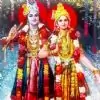Ram & Sita: Me Without You is Incomplete: part 13
Uttar Kanda
After their coronation, Ram and Sita spent quite sometime in Ayodhya as king and queen of their beloved city. I have read varied versions on how much time they had together post vanvaas in Ayodhya- anywhere from a few months to a few years. They were back together, as husband and wife but their responsibilities as king and queen soon dominated their lives. If one were to read in between the lines, I feel, they both missed their carefree lives in the forest. Being king and queen came with a baggage, a burden that ultimately resulted in their final separation.
Here are some citations on their life as king and queen:
When the pushpaka vimana had gone, Rama went to a private garden in Ayodhya, where a profusion of chandana, aguru, deodar, champaka, punnaga, madhuka, asana, and other trees grew: the finest of their kinds. Unearthly parijatas here were like a mass of smokeless flames, with the sap of their sires that grow in Devaloka.
Rama came into this garden and found Sita at its heart, waiting for him on a stone seat. Rama wrung some sweet nectar from a few flowers, a drink as heady as maireyaka wine, and gave this to Sita to drink: even as Indra makes Sachi drink. Food and fruit were laid out for the king and his queen, and when they were alone, a troop of apsaras materialized before them and sinuous naga women, with gandharvas and kinnaras. They drank with Rama and Sita; they sang and danced for them. When the mood was set and the drink high in the royal couple's veins, the unearthly minstrels and dancers vanished as they had come. Rama turned to his love and drew her tenderly to him. Thus their time passed. Rama would spend half his day attending to the affairs of the kingdom; then he would come to Sita in their garden. She, for her part, would spend her mornings seeing to her domestic chores, and especially looking after the needs of her three mothers-in-law, without favor or distinction. Then she would keep her daily assignation with Rama in the charmed grove. One day he said to her, "It is time you bore me a child, my love." And she turned her face shyly from him and whispered, "I want to go and spend a night in the forest in an asrama. I want to have the rishis' blessings." He cried in joy, "You will go tomorrow!"
Menon, Ramesh (2004-05-26). The Ramayana: A Modern Retelling of the Great Indian Epic (p. 596). Farrar, Straus and Giroux. Kindle Edition.
Soon, all the visitors left. We got into the daily humdrum of life. The life of royalty. We would get up early in the morning to the sounds of music being played by the court bard. We would be ushered to the dining room for our breakfasts. Then would follow our daily routine of being in the Sabha hall to listen to the complaints of the people, sorting out the administrative challenges of the huge empire, meeting dignitaries from other countries and so on. It was hectic life. I soon started missing the forest. It was so peaceful then. You could be your own person and do your own thing. You were not at the beck and call of everybody. People think that to be a queen is a reward in itself. I have never found it to be so. There are queens who revel in the power, the pride and the royalty but I have never been one of them. I was happier being outside on the fields... guess that is why the forest was always amazing despite the dangers in it. But I was the queen and I had my duties.
Life went on. I had relegated the disquiet to the back of my mind. With so much work, there was no time to dwell on the anything else. In addition to all the queenly assignments, I was two months pregnant. I was happy. My mind was peaceful. People around me took good care of me and I had reached a state of mental equilibrium which is difficult to explain. Rama was overjoyed when given the news. His hug put all my doubts to rest. He loved me. I was his soul mate.
Sundaram, Uma (2014-04-22). Seetayana: The Untold Journey (Kindle Locations 2377-2384). Uma Sundaram. Kindle Edition.
Sita soon became pregnant- mother to the heir of Ayodhya.
Here is a citation on Sita's early days of pregnancy on Ayodhya:
Over the last few months, now that Sita was pregnant, Urmilla had created a checklist of her cravings. They seemed different from most pregnant women in Ayodhya. Your child bears the mark of a foreigner,' Urmilla said the other day as she came in hastily with a bowl of soft skinned almonds. Sita loosened her hair for the massage before her bath. Both women looked at each other. Urmilla bit her lip and said, Oh, Sita, I didn't mean ...' Sita burst out laughing. Of course, you didn't mean what you said.' Urmilla was embarrassed. It was too clumsy a mistake and, relieved by Sita's quick response, she began to chew the soft almonds before she offered them to Sita. All I really wished to say was that this child will bear the mark of our birthplace, Mithila.' Sita lay down on the mat ready for the warm oil, scented with camphor and hibiscus leaves, to be massaged into her long, bee-black hair. Urmilla's fingertips were firm, pressing all the pressure points at the back of her neck. Sita winced with pleasure as the tension was released from her neck. How strangely time heals, Urmi. I had never thought I would be able to laugh so easily about the whole foreigner thing,' Sita said thoughtfully.
Be careful, Sita. After all these years, much as Ayodhya is our home now, we too are foreigners here,' Urmilla said as she looked towards the door, hoping no one was listening. Ravana was a dreaded name even after his death. After all, when women marry they get adopted by their husbands' people,' she continued.
Urmilla kissed Sita's forehead, saying, Long may that thought prevail, Sita. Let your child hear that and carry it forward, whether it is a son or a daughter.' She was swift in moving from the role of friend and oracle-bearer to that of masseuse. Okay, now let's see how the great belly is doing.' Sita swept the cloth off her belly. The shaft of sunlight peeping through the skylight of the bath chamber swathed her belly. Urmilla anointed her palms with warm coconut oil and placed them on the sides of Sita's stomach. Great mover! I hope he's a dancer first, then a warrior,' she said. How are you so sure it is a he?' Protrusion of the belly. Pushing its way into the world, only a man can do that,' Urmilla said with her arched brow and cheeky smile. They both giggled abashedly.
During the day Rama was busy with affairs that brought people from different parts of the kingdom to seek his audience, offer counsel or represent grievances and inform him directly. In the afternoon, before lunch he would be briefed on matters within the court and its councils. He would retreat to his palace where Sita waited for them to have lunch together. When Rama entered his chambers, Sita was bustling with the aarti platter, the flame burning brightly in its centre. She waved it steadily clockwise before him, from right upper arm to above the forehead to the left shoulder and down to his knee, circling it three times and finally placing the vermilion mark on his forehead. It was a ritual to keep out sinister spirits and malevolent energies encountered during the morning duties. She looked at him through the camphor's flame. The flame was a window for both of them to focus on. She, smiling but looking at him intently; he, disturbing her steady gaze with a smile that hovered at the corner of his lips. It was his way of saying: After all those deep and dark forests, here we are, urbanized, wearing fancy clothes. A fine drama" these waves of life. Let's enjoy this act for now.' That's how she greeted him home for lunch every day since they had returned. In fact, that was also how the news of her pregnancy became public, when she deftly handed the aarti platter to a maid of honour and fainted, with Rama quick to catch her fall. Today, when all the maids-in-waiting slowly bowed and left the dining hall, Sita and Rama smiled at each other. It was after a long time now that, through the scaffolds of daily rituals, they were returning to their former selves. Exile had made them strangers to a life in court. Sometimes living in a palace struck them as yet another brief sojourn from the forest. In the late evenings they were, independently, haunted by the prospect of preparing for a departure. Exile is not dislocation, it is a rising sense of loss. The loss of time and experience amidst the whirlpool of life. Quite simply, there was a lot to converse about, but the hopelessness of being left behind dogged them. The real challenge lay in moving forward in spite of feeling paralysed. They constantly straddled the emotional geographies of exile and royal luxury. They had begun to realize that moving across geographically, covering the terrain of forests, mountains, rivers, even an ocean, was more bearable than defining an emotional geography.
With two in a companionship, how did one map what was unseen in the other? Even in oneself? At last, a bridge had emerged between them" Rama and Sita's child, yet to be born. This foetus was the desire for life swimming in a limitless ocean within the universe of the womb. It sparked a new channel of communication between them.
Naidu, Vayu (2012-12-01). Sita's Ascent (pp. 14-15). Penguin Books Ltd. Kindle Edition.
Rama was pleased to see that his wife was beginning to show signs of being pregnant. "I see that we shall soon have much to celebrate!" He said to her. " What can I do for you?" Tell me, which wish of yours can I fulfill?"
"I want to see the peaceful places for meditation in the forest," she replied with a smile. "I would like to sit at the feet of thepowerful sages who live on the banks of the Ganga and eat only roots and fruits. It is my dearest wish to spend at least one night with them!"
"You can go there tomorrow," promised Rama as they went into the middle enclosure of the palace, surrounded by their friends.
--Valmiki's Ramayana translated by Arshia Sattar
And then, came that conversation between Rama, his friends and other ministers of his kingdom that changed their lives once again- this time forever.
"Bhadra, tell me what our people say about me these days. Do they love me as they used to before I became king? And what about Sita, Lakshmana, Bharata, and Shatrughna? What do our subjects say about them? What do they say about mother Kaikeyi now? Tell me truthfully, Bhadra. A king must know what his people think of him. Don't spare me anything they say, good or bad."
" Yes, and he brought Sita back with him and he loves her just as he always did.' " But isn't the pleasure he feels being with her a depraved joy? When he knows the Rakshasa carried her away and kept her with him for many months, and surely...'" Bhadra glanced anxiously at Rama, but there was no hint of any surprise or grief on that noble face. Rama merely nodded, impassively, that he should continue. Bhadra continued, "My lord, they say, Why does Rama keep such a woman beside him? Doesn't he realize that we, too, will have to endure our wives
straying, because the people always follow what their king and queen do?' Rama, this is what your subjects are saying, in the streets of Ayodhya and in every town and village in your kingdom." Now Rama's lips quivered in anguish, and he looked around his sabha at his counselors, from one face to the next. They all turned their gazes from him. At last he asked them, "Is what Bhadra says true?" As a man, all of them whispered, "It is, my lord." For a moment he seemed to have turned to stone. Then he said to them, "Leave me for a while, my friends."
When they had gone, he said to his dwarapalaka, "Bring Lakshmana, Bharata, and Shatrughna to me." They came at once, and saw their brother's face was like an eclipsed moon, a withered lotus; they saw his eyes were tear-laden. They bowed deeply to him, and he embraced them and made them sit in their thrones set close to his own. He said to them, "You know how Sita entered the fire on Lanka, and Agni himself returned her to me; all the Gods appeared to attest to her purity. And I brought her home to Ayodhya, knowing she was perfectly untainted, in body and mind. But the people are not convinced. They judge her by their own lives, their own beliefs." He broke down now, and sobbed, "The people say how will their wives be faithful to them when the king has brought home a woman who was abducted by the Rakshasa and kept in his asokavana for so many months? They say surely Ravana enjoyed Sita. They are saying she has sinned, that she is not fit to be their queen or my wife." Lakshmana cried in anger, "You don't mean to take what they say to heart? The people will talk, Rama; they are common. They cannot understand chastity like Sita's." But his brother raised a hand that he should stop. Rama said, "I am the king.
Menon, Ramesh (2004-05-26). The Ramayana: A Modern Retelling of the Great Indian Epic (p. 597). Farrar, Straus and Giroux. Kindle Edition.
In Valmiki's story, the trial by fire after the war exonerates Sita and the Yuddha Kanda ends with Rama's triumphal return to Ayodhya and his restoration to the throne. But the Uttara Kanda places Sita once again in the realm of doubt when town gossip about the time she spent in captivity reaches Rama's ears. She is pregnant, ready to bear Rama an heir to the throne, which is perhaps why the anxiety about her fidelity is heightened. This time, Rama treats the calumny against Sita as a criticism of himself, a criticism that he, as king, can neither afford
nor abide. Rama calls for all his brothers and sadly tells them of the decision that he has made. Commoners as well as prominent citizens hold me in contempt. I find that very painful. I was born into the great and noble family of the Ikvkus . . . In the presence of the gods and the gandharvas in Lank, she was given back to me after she had been declared pure. I knew in my heart that the virtuous woman was innocent and so I accepted her and brought her back to Ayodhy. But now, the terrible things that people are saying make me unhappy. An infamous man who is the subject of common discourse goes to the hells of the unrighteous and stays there as long as the story of his disgrace is told. The gods do not love the notorious and even the world loves a man who is well-spoken of. Good men's deeds are motivated by a desire for fame. I would give up my life, even renounce all of you, for fear of a scandal. How can I hesitate or do anything less in St's case?' (Sattar 663- 64) With that, Rama commands Lakshmana to take Sita into the forest and leave her there to fend for herself as best she can. On both occasions when Rama has to reject Sita (in Lanka and then in Ayodhya), he mentions his family and its nobility. After the war, he says, How can a man born into a noble family lovingly take back a woman who has lived in the house of a strange man? I am proud of my noble lineage.' And in Ayodhya, Rama reminds his brothers that he was born into the great and noble family of the Iksvakus'. Further, when the gods return Sita to him in Lanka, he says that he had allowed the public test of chastity because otherwise people would have said that Rama, son of Dasharatha, was blinded by his love for a woman.' Rama is clearly worried about what people will think and say about his beloved wife and, by extension about him, whatever he might feel about her innocence. And because he chooses to mention his lineage (which must include his father) both times, we can be persuaded that Rama carries the burden of his father's folly and that he is determined to compensate for it at any cost.
Sattar, Arshia (2011-06-09). Lost Loves: Exploring Rama's Anguish (Kindle Locations 529-533). Penguin Books Ltd. Kindle Edition.
The people of Ayodhya and the reputation of the Iksvaku dynasty are of primary importance. This time, there is not even a trial for Sita to prove her innocence" Rama makes a swift and unilateral decision to banish her into the forest where she had been so happy, telling his brothers that they are not to question him or argue with him. He is even willing to put aside the fact that he has never doubted Sita (a fact he mentions over and over again) just so that he can prove to the world that he is not besotted, that he is still capable of thinking unemotionally about his wife. The people of Ayodhya will not have occasion to say again that their king loves his wife more than he loves dharma. Does Rama's heart break again on this second occasion? He does not ask for proof, he does not even tell Sita himself that he has banished her. Lakshmana is assigned the task of taking her to the forest and leaving her there, that too, under false pretences, for Sita is told that she is going to visit the wives of the sages who had become her friends during their time in the forest. Perhaps Rama cannot put himself through another moment of confrontation with her, nor can he bear to humiliate her again in public, in front of her
own people. Perhaps he knows that he will weaken if he were to tell her himself, for he loves her still. Perhaps he would not be able to bear her unspoken criticism as he bows to the will of the people at a time when he should defend her with the truth that has been proven in Lanka and which is the same truth that he holds in his heart" that despite murderous threats and lavish promises from Ravana, she never stopped loving him and that she remained faithful to him in every sense of the word.
Sattar, Arshia (2011-06-09). Lost Loves: Exploring Rama's Anguish (Kindle Locations 574-582). Penguin Books Ltd. Kindle Edition.
...to be contd



























